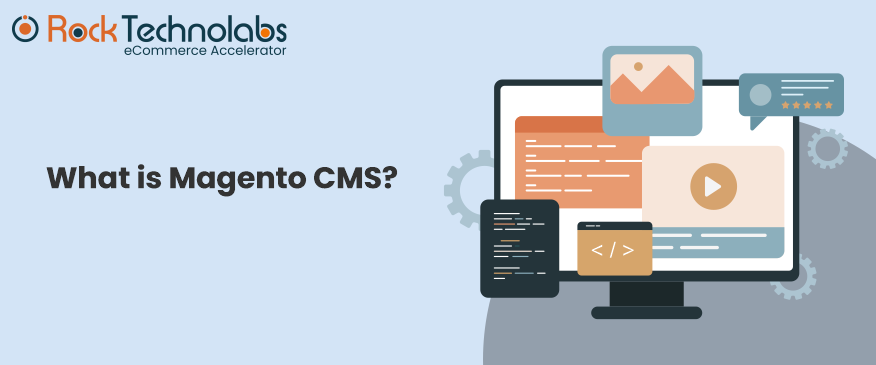Leverage Magento CMS For Managing Content Effectively

The thought of launching a website itself seems exhilarating; although it involves a level of stress for creating and managing it with hardcore programming techniques, nowadays, CMS offers countless benefits in terms of saving you time and money.
CMS (Content Management System) helps to quickly construct a website with limited technical resources and coding skills via the creation of informational content that brings more leads and conversions.
CMS is basically a tool that requires no hard lines of coding from scratch; instead, you can handle your site’s infrastructure, plus there are a plethora of CMS available in the market to support online stores with a content focus approach, including the most famous WordPress, Joomla, Drupal, Wix, and Magento. However, here we are going to explain why Magento CMS is the finest of all.
Despite being engineered for ecommerce, have you thought about how Magento is a stunning platform as a CMS to offer a complete solution for all content needs? Today, we eliminate the challenge of choosing a CMS by letting you know why Magento CMS is the ideal platform for content publication.
Why Choose Magento CMS For Your Ecommerce Store?
There are hundreds & thousands of businesses using Magento, including big ones, and this platform is listed as one of the leading ecommerce platforms. The best thing about this, it is totally free and professional.
Magento CMS is known as an Open-source ecommerce platform with excellent and almost infinite customization capabilities. Moreover, it is a hub of more than 3500 extensions with an abundance of functionalities that allow it to integrate payment gateways, third-party integrations, and analytical tools which provide limitless possibilities in scaling up the business.
Currently gaining a share of 1.1% of the CMS market, and according to the data from Magento, this CMS platform is a pool of more than 250,000 merchants who depend on Magento to run their online business. Furthermore, offers improved website speed, SEO-friendly CMS, optimization for multiple devices, advanced security patches, and more.
Advanced SEO Features
Research has proven that for ecommerce sites, organic search is the primary source to drive traffic. Magento CMS comprises all the advanced features you’ll need for SEO, including URL key, meta title, keywords, meta description, mark-up data on pages, setting up of XML sitemap, and other features to raise ranking on search engines.
Plus, it improves crawlability and indexation with keeping aside duplication of content and usage of plugins, leading to better search engine ranking. Magento also comes with default URL and sitemap functionalities that save a lot of effort in small tasks.
Rich Ecosystem Of Extensions & Themes
Magento has an official marketplace where you can buy third-party extensions and themes. Plus, they have an extension quality program to ensure all extensions meet their quality guidelines. It has a wide range of features that make it easy to manage and operate your store with more extraordinary performance and efficiency.
You can browse over 1000s of free extensions and themes; these extensions are available for ERP, CRM, marketing automation, advertising, personalization & customer experience, order management, warehouse management, product content, and many more. Moreover, you can efficiently deliver valuable and informative content to your audience through adding blog sites, utilizing page builder, and creating customer groups while tracking the performance.
Magento merchants take benefit from both paid and free themes that are accessible for almost all industries, including automotive, electronics, pet, home, food, and others; you can also pick the themes by sorting them from higher price range to lower, lower to higher and according to rating.
High Performance & Scalability
Magento CMS is built on a modular architecture that supports easy scalability and growth to fulfill the requirements of developing a business. It has an advanced indexer to speed up the site performance by updating data regularly, including user, inventory, price, content, catalog, and others. Plus, it has other performance-enhancing features like full-page caching other than indexer that helps boost up the store system, thus resulting in the smooth functioning of processes.
It means your Magento store can handle high traffic load and have enough capacity to grow without any major disruptions; even its loading time is reduced from 5-6 seconds to around 1–2 seconds, which persuades customers to visit the store frequently. While scaling up, merchants don’t need to worry about security issues as they can be eliminated with security patches, two-factor authentication, inscription key tools, and other security methods.
Mobile Friendly Configuration
According to 2021 data by Statista, 2.2% of ecommerce website visits convert into purchases on mobile devices, so online merchants must ensure that their store is mobile optimized. Magento is equipped with a responsive design for mobile and other devices that bestow with an excellent shopping experience to customers.
Additionally, customers would be able to reach content directly on their mobile devices, which aids in significantly boosting your audience’s interest in what you are providing them, and Magento CMS has a separate set of tools that enhance the mobile experience. By leveraging content wisely, you can open new doors for more sales opportunities.
Magento CMS elements
Magento CMS elements can be used to manage and create all website pages that are compatible and capable with all website templates. Its main elements are CMS pages, blocks, and widgets that support meeting other business needs in addition to content, including analyzing sales data, collecting customer information, processing orders, launching promotions, and managing catalogs.
Magento elements are simple to use with drag-and-drop capabilities and have a modern design for quick understandability.
Magento CMS Pages
Magento CMS Pages are a set of Magento 2 content pages that are used to distribute content in the overall website. It not only facilitates the creation of different pages; rather, it translates pages as per the local language. Plus, you can hide CMS pages for a certain group of customers.
You can create thousands of pages and make use of rich featured capabilities, including filters, default, views, columns, actions, and searchability. Easily add new pages using add new page button and start working on it.
Admin can check the details of numerous pages’ details regarding their status, URL key, store view, status, created, modified, title, and more. With the help of various filters and searchability options, you can quickly find a page, make changes within a few minutes to any existing pages, and perform bulk action for the same simultaneously. You can also add and remove the columns as per your preference and convenience.
Furthermore, the Magento CMS page editor has a smooth interface; however, experienced users can also switch to its html mode. You’ll find that some pages have already created by default when you installed the Magento sample data, which usually covers almost all ecommerce store needs in line with business scenarios such as home page, about us, privacy policy, customer service 404- not found, enable cookies, etc.
Magento CMS Block
These are static content blogs to add different types of content sections on any of the website pages. As the name suggests, static blocks have certain content elements that remain unchanged, plus offer the same functionalities similar to CMS web pages which means you can check details of all page blocks in relation to their status, URL key, store view, status, created, modified, title and more.
Admin can enable/disable any CMS block, set the CMS block title & identifier, and assign it to all store views, main website, main website store, or default store view. You can also position blocks at specific locations on the page or within product and category areas using XML widget after creating them.
CMS block has a bunch of content editing tools (same as CMS page workplace) that can be added by utilizing WYSIWYG editor (text font, size, alignment, bold, italic, underline, link creation, and availability of attaching media files) which helps merchants to make the content appealing and eye-catching, assist in design customization. As mentioned above, if you are more comfortable in harnessing html code, you can use the show/hide editor option and start inserting code in the text area.
Magento CMS Widget
Magento widgets are similar to CMS blocks; although, they are used as placeholders for dynamic content. It’s a perfect option to attack real-time dynamic content that increases engagement and ensures a more personalized user experience, thus resulting in higher conversion rates.
Using widgets, merchants can also create marketing campaigns to display advertising-related content on landing pages and other website locations. By leveraging custom widget functionalities, you can build your own widget templates for a specific target audience; plus, it has many advanced configuration options to utilize its full potential.
It has also multiple types (Recently Compared Products, Catalog Products List, Orders and Returns, Catalog Product Link, Catalog Products List, Custom Block Widget, and more); in addition, gives design options, layout update settings, and many more that boost sales with fantastic customer experience.
Wrapping Up
Content plays a crucial role in answering your audience queries, developing trust in relationships, improving conversions, increasing brand awareness and getting better customer traction. Magento understands the demand of today’s customers from their favorite brands, therefore constantly escalating the capabilities for running a seamless online business.
Magento content management system is a good choice that can bring drastic change when you open your online store while keeping priority on content creation. To date, Magento has launched multiple versions of its platform to offer robust and feature-rich functionalities to its Merchants.
Magento is an all-purpose solution for tailor-made and customized options for content management to meet the diverse needs of small, medium, and large enterprises; you just need to unlock its benefits. We are here to support your business to get the maximum out of Magento with minimum cost and time through their years of specialization in the ecommerce domain.








